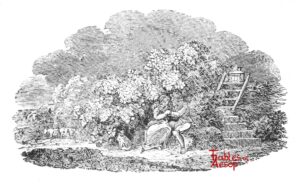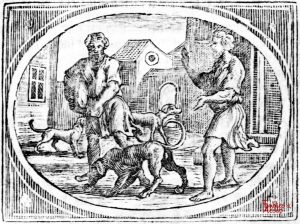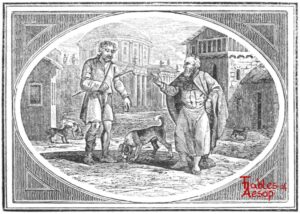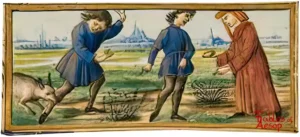A Man bitten by a Dog was advised to feed the Dog bread soaked in the wound. Others pointed out what a bad idea it was to give the Dogs an appetite for Man.
It is unwise to reward when one should punish.
A Man bitten by a Dog was in search of something to heal him. A friend suggested he soak a piece of bread in blood from the wound and feed it to the Dog who bit him. The Man laughed at this and said: “If I do as you say I would just whet the appetite of that Dog and every other dog in town.”

Townsend version
A Man who had been bitten by a Dog went about in quest of someone who might heal him. A friend, meeting him and learning what he wanted, said, “If you would be cured, take a piece of bread, and dip it in the blood from your wound, and go and give it to the Dog that bit you.” The Man who had been bitten laughed at this advice and said, “Why? If I should do so, it would be as if I should beg every Dog in the town to bite me.”
Moral
Benefits bestowed upon the evil-disposed increase their means of injuring you.

JBR Collection
A Man who had been sadly bitten by a Dog, was advised by an old Woman as a cure to rub a piece of bread on the wound, and give it to the Dog that had bitten him. He did so, and Aesop, passing by at the time, asked him what he was about. The Man told him, and Aesop replied, “I am glad you do it privately, for if the rest of the Dogs of the town were to see you, we should be eaten up alive.”

Samuel Croxall
A MAN, who had been sadly torn by a Dog, was advised by some old woman, as a cure, to dip a piece of bread in the wound, and give it the cur that bit him. He did so; and Aesop, happening to pass by just at the same time, asked him what he meant by it; the Man informed him: Why then, says Aesop, do it as privately as you can, I beseech you; for if the rest of the Dogs of the town were to see you, we should all be ate up alive by them.
THE APPLICATION
Nothing contributes so much to the increase of roguery, as when the undertakings of a rogue are attended with success. If it were not for fear of punishment, a great part of mankind, who now make a shift to keep themselves honest, would appear great villains: but if criminals, instead of meeting with punishments, were, by having been such, to attain honour and preferment, our natural inclinations to mischief would be improved, and we should be wicked out of emulation.

Thomas Bewick (A Man Bitten by a Dog)
A Man, who had been sadly torn by a Dog, was advised by some Old Woman, as a cure, to dip a piece of bread in the wound, and give it to the Cur that bit him. He did so, and Aesop happening to pass by just at the time, asked him what he meant by it? The man informed him. Why then, says Aesop, do it as privately as you can, I beseech you; for if the rest of the Dogs of the town were to see you, we should all be eaten up alive by them.
APPLICATION.
Vice should always be considered as the proper object of punishment, and we should on no account connive at offences of an atrocious nature, much less confer rewards on the criminals: for nothing contributes so much to the increase of roguery, as when the undertakings of a knave are attended with success. If it were not for the fear of punishment, a great part of mankind, who now make a shift to keep themselves honest, would be great villains. But if criminals, instead of meeting with punishment, were, by having been such, to attain honour and preferment, our natural inclination to mischief would be increased, and we should be wicked out of emulation. We should rather strive to make virtue as tempting as possible, and throw out every allurement in our power to draw the minds of the wavering and unsettled to espouse her cause.


L’Estrange version
One that was bitten by a dog, was advis’d, as the best remedy in the world, to dip a piece of bread in the bloud of the wound, and give it the dog to eate. Pray hold your hand a little (says the man) unless y’ave a mind to draw all the dogs in the town upon me; for that will certainly be the end on’t, when they shall find themselves rewarded instead of punish’d.
Moral
Good nature is a great misfortune, where it is not manag’d with prudence. Christian charity, ’tis true, bids us return good for evil; but it does not oblige us yet to reward where we should punish.

Gherardo Image from 1480

Canis et Homo Admorsus
Quidam a cane morsus, quaerens qui vulnus curare posset circumibat. Cum id quidam casu obvius audisset, “Heus tu,” inquit, “si sanus vis fieri, panem sumito, cum eoque vulneris sanguine deterso, cani qui te momordit edendum praebe.” Tum ille, subridens, “At si istud fecero,” inquit, “nullum erit effugium quin me omnes canes urbis discerpant.”
Perry #064


